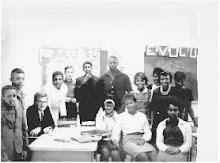Teacher Preparation is near Impossible as Currently Conceived
The path to teacher accountability & results-justifiable tenure is obstructed by an error in logic that is not only easily fixed but would greatly improve efficiency and effectiveness in every classroom. Teacher certification and staff development are seriously flawed. There is no real market place in proven ideas, in some ways Teacher Education is unregulated, a "Free Market" controlled by vested interests and locked in place by another case of industry blindness. It is more of a mishmash of competing whims and crystallized but untested practices with no continuity across the profession.
I wonder, on these grounds, whether you might help me find professionals, ideally yourselves, that are interested in collaboration on what has become a Herculean, but potentially very low cost, and fundamentally simple (Freakonomics-like) solution. It is an effort to more scientifically identify what should be the core curriculum of every teacher education program, but has somehow not ever been aggregated, namely, our Best Pedagogical Practices. Doing so would lift the entire profession since there is no other profession that has not done this in some shape or manner. It could be argued that the absence of preparation in a core curriculum makes teacher education impossible, and therefore, evaluation of teacher effectiveness based on student outcomes illogical, if not irrational. Currently there is absolutely no agreed upon congruency of principles and practices from one professor to another, let alone from one School of Education or School District to another. We desperately need something resembling algorithms, empirical studies and ongoing case reports on Best Practices. Ironically, there has been pretty remarkable progress in pedagogical science made in the last 50 years, it could even be called a Cambrian Period as when many new life forms began to appear on planet earth.
The development of some brain-aids such as algorithms to help identify the most probable Best Practices would be a giant step toward invisible guiderails. Checklists for example would better guide the identification of the best Instructional options for a given situation. Of course, professional human judgment should always be able to supersede the decisions made by an algorithm, even though such formulas represents much of the wisdom accumulated around a specific instructional choice. The fundamental value of checklists and algorithms is that they most likely will improve student-learning outcomes near irrespective of teacher skill and our otherwise human instincts that can be seriously wrong when placed alongside empirically, and coolly established judgments. Formulas or equations are not teacher-proof, but they do reduce a class of decision and knowledge errors that currently have too great apart in teaching. This only appears to be less than professional, but it is in fact next-generation professionalism. For example it is now widely acknowledged that pilots make many fewer errors when they follow the industry wide constructed check-off lists. Similarly, life threatening errors have been reduced by a considerable degree when surgeons and support staff have carefully followed check-off lists before, during and following surgery; the more error prone surgeons have been made less so, and the more skilled even more so. Ideally, and most likely, as teachers are guided to better instructional decisions, overall decision-making, and strategic thinking are also likely to follow. Doing better is self-reinforcing. There are some instructional methods that actually have been designed to accelerate such teacher learning, they contain an element called heuristic properties, or enactments that tend to increase discovery of better and more effective teaching.
All stakeholders can now be more easily involved in identifying Best Practices, and in an ongoing process to provide field-based guidance of where these choices falter and/or simply need a bit of tweaking. The effort would take place on the web where all could see and participate, and to that extent would be visible exercise in science and participatory democracy. As science it would be instructive of analogous issues since it would not be supportive of radical decision making driven by competition ideologies, but rather more incremental, and yet a sharp change from the power politics that we all tire of, but rather a model of the democratic process that inherently calls for the union of expertise and the wisdom of crowds. The visibility of the process could be very instructive of how tough decisions can be made in the larger body politic.
To put a philosophical floor under this action, it leans toward being more Hamiltonian than Jeffersonian. Hamilton believed in using government in limited but energetic ways to advance general knowledge and practices. He also had a pretty practical view of Education, he believed that when done right it was the best path toward increased social mobility, or raising all ships. Most importantly, he was a great advocate individualism, a cornerstone of American culture. On that basis, teachers, in my view should be given great freedom in constructing what amounts to My Best Practices. This option is built-in to the TORIC algorithm ahead that involves and invites teacher input all along the way, and actively encourages teachers remaining responsible for their Choices; Only then, with fuller knowledge of instructional options, and can they reasonably be held responsible for student outcomes.
Should working toward such an algorithm and fine-tuning of instruction system interest you please look in on my early attempt to jump-start such an effort. It would be a very worthy project for the School of Education. The current form exceeds my aging capacity. See: http://bestmethodsofinstruction.com/. Comments and help welcomed.
Respectfully,
Anthony V. Manzo Ph.D. Professor Emeritus, University of Missouri-KC,
& Director of The Center for the Study of Higher Literacy,
Governor, Interdisciplinary Doctoral Program;
(ret.) California State University-Fullerton

No comments:
Post a Comment